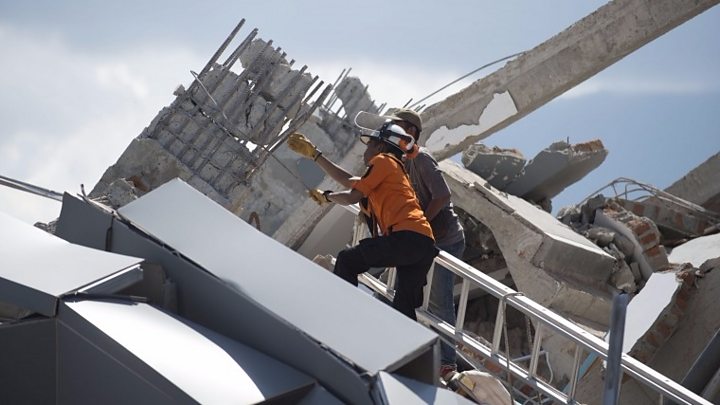Indonesia earthquake: Dozens feared trapped under quake rubble

Dozens of people are thought to be trapped under the rubble of buildings in the Indonesian city of Palu following an earthquake and tsunami.
Rescuers are awaiting heavy machinery to search the ruins of a hotel and a shopping centre as aftershocks made it unsafe for them to go in.
They have been getting water and food to some of those trapped, who have been screaming for help to get out.
The quake and tsunami killed at least 832 people, officials say.
The national disaster agency has announced plans for mass graves and one that was being dug on Sunday night is expected to hold at least 300 bodies.
Indonesian President Joko Widodo visited the region to urge a "day and night" effort to rescue survivors.
Patients and corpses side by side
By Rebecca Henschke, BBC News, Palu
Lying on a stretcher in the dark outside the Mamboro health clinic in Palu is a five-year-old girl with a broken leg. She was found alone, Doctor Sasono tells me. "We don't know where her family is and she doesn't remember where is lives." His clinic has no power and is running out of medical supplies.
A few metres from her stretcher bed are rows of bodies in bags. The smell of decomposing bodies fills the air.
Dr Sasono says they will be buried in mass graves to stop the spread of diseases: "They are starting to smell. We want to wait for relatives to pick them up but we can't wait any longer."
Rows of rubble lie all along the shoreline where vibrant fishing villages once stood.
People's possessions lie smashed together with cars and boats tossed around by the massive waves. Amid the rubble are tents where families are sleeping out in the open.
How difficult is the rescue work?
Local media report that mobile phone signals have been detected in the rubble of the shopping mall and shouts can be heard under the debris of the Roa Roa Hotel.
One volunteer, Thalib Bawano, told AFP news agency that three people had been rescued from the hotel rubble, where more than 50 people may be trapped.
"We also heard voices at several points, including a child," he said.
"They were asking for help, but they are still there till now. We gave them motivation... so they can have spirit because they are trapped between life and death."
"We gave them water and food but that's not what they wanted. They wanted to get out. 'We want to get out, out, out. Help! Help!' they kept screaming. That's what we heard. Some were just knocking."
Blocked roads, a damaged airport and broken telecommunications have made it difficult to bring help into the affected area.
What are the other challenges?
Survivors of the disaster have been sleeping in the open, wary of returning to their homes, even if they are still intact.
With hospitals damaged, injured people have been treated in the open and at least one military field hospital has been set up.
The military has taken over the airport to fly aid in, and injured people and other evacuees out.
"What you'll see, you know, as the days go by and people don't have access to adequate hygiene supplies, shelter, you'll see the situation deteriorate if they don't get that access so, we've sent shelter kits," Tom Howells, programme director for Save The Children, said on Sunday.
Power is down in much of the area and so are mobile phone signals. Very little has been heard from other communities along the coast, which are also likely to have been hit hard by the tsunami.
Why were so many killed on Friday?
The 7.5 magnitude quake occurred at a depth of 10km (6.2 miles) just off the central island of Sulawesi at 18:03 (10:03 GMT) on Friday, setting off a tsunami, US monitors say.
Many people were on the beach in Palu, preparing for a festival, and were caught when the waves swept in.
The earthquake was powerful but shallow and with more lateral than vertical movement, not typically the kind of tremor that sets off tsunamis.
Vice-President Jusuf Kalla has said the final death toll could be in the thousands while the Red Cross estimates that more than 1.6 million people have been affected.
Have you been affected by the earthquake? If it is safe to do so, share your experience by emailing haveyoursay@bbc.co.uk
Please include a contact number if you are willing to speak to a BBC journalist. You can also contact us in the following ways: